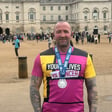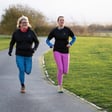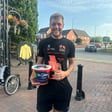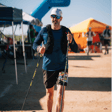Become a Creator today!Start creating today - Share your story with the world!
Start for free
00:00:00
00:00:01

Kim Ingleby
In this episode of the UKRunChat podcast, we chat to Kim Ingleby to explore her incredible journey as a runner, triathlete, and coach. Kim shares her experience overcoming various health challenges, the role that mindset played in her recovery, and how she’s helped others break through barriers to achieve their goals.
We dive into her love of the outdoors and moving her body, the adjustments she’s made post-injury, and her top tips on health, mindset, and building resilience. Kim talks us through practical advice for chasing goals, beating imposter syndrome, and stopping that sabotaging self-talk.
Follow Kim on Instagram @kimingleby
https://www.energisedperformance.com/
Transcript
Introduction to Kim Ingleby and Energize Performance
00:00:00
UKRunChat
Hello, welcome to this episode of the UK Run Chat podcast. Today, we're joined by Kim Ingleby. Hi, Kim. Welcome to the podcast. Thanks for coming on to the episode.
00:00:10
UKRunChat
Would you like to would you like to give our listeners a brief introduction to yourself?
00:00:11
Kim Ingleby
Thank you, Michelle.
00:00:16
Kim Ingleby
ah Hi, listeners. um I hope you're all good today. My name is Kim Ingleby. I run Energize Performance. ah It's a mind and body coaching company, and I work with all sorts of runners from like beginners, and people coming back from injury, illness, right up to elite athletes, adventurers, explorers,
00:00:38
Kim Ingleby
anyone really that has a tiny goal or a big goal, ah I can help you.
00:00:44
UKRunChat
Yeah, brilliant.
Kim's Journey into Coaching
00:00:45
UKRunChat
So how did you get into coaching? What's your background in terms of sport and then getting into the coaching side of things?
00:00:52
Kim Ingleby
Coaching, ive i mean i've I've worked and run my business since I left school.
00:00:56
UKRunChat
Yeah.
00:00:57
Kim Ingleby
So it's always what I kind of wanted to do. My first sport was I'd say sport, but was farming, like being outside and and obviously not a sport, but, you know, there was a community with that and young farmers and sort of working on the farm, doing the lambing, and you know, going to events, going to Edinburgh, sort of Royal Agricultural Show.
00:01:06
UKRunChat
Wow.
00:01:23
Kim Ingleby
And then I sort of got into horse riding and that led to Pentathlon and Tetrathlons, so that had the running aspect. But to be honest, I hated running. I really hated it. it was I was rubbish, exercised in juice asthma, always went bright red, got teased for being bright red. And it just generally was like, oh, no, like, it's not for me. But I also wasn't that good at any sports. I was like the person to be picked last and
00:01:54
Kim Ingleby
I think with my dyslexia and dyspraxia, I was kind of like not that coordinated. um And then with
Perception, Self-Sabotage, and Social Media
00:02:00
Kim Ingleby
ADHD wasn't very focused. So it was kind of like, you know, a bit of everything and not very good at anything. and From three day eventing, I worked at Glen Eagles and got my coaching within riding and then ended up down south and because of sort of working as an apprenticeship and then sort of went on a journey from there. But I've always had,
00:02:22
Kim Ingleby
and an element of coaching, giving back, um charity work. Even when I did my Duke of Edinburgh when I was like 14, 15, you know, I did sort of support events and teaching then.
00:02:34
Kim Ingleby
So it's just been kind of like what I want to know.
00:02:39
UKRunChat
Yeah.
00:02:39
Kim Ingleby
So hopefully I can impart some things today that will inspire someone or make them feel like, or maybe I could give that a go.
00:02:47
UKRunChat
Yeah, that's funny what you say about you kind of not being kind of a good runner and kids teasing you yet you've ah you've always obviously been very active. it's It's strange how we have this perception of ourselves, isn't it that we're we're not great at something or we don't enjoy something. But yeah, so I'm interested to hear how because you've done a lot of triathlon as well, haven't you? And And you're always checking us and in your in your kind of running posts.
00:03:09
Kim Ingleby
I have, yeah.
00:03:11
UKRunChat
I love seeing them on our Instagram. We do share them when we can.
00:03:15
UKRunChat
So yeah.
00:03:15
Kim Ingleby
Oh, you do, yeah.
00:03:17
Kim Ingleby
I think I'll pick up on like perception, Michelle, just briefly. And it's really interesting, like with perception, particularly with social media, that we can look at images and kind of do an unconscious comparison of like I'm not good enough or I can't do that or I often get like I can't reach out to you because I only do this and I'm like oh please reach out to me like it doesn't matter what you do but we all have a perception and it's just it's natural and then we have a perception and a judgment of ourself
00:03:35
UKRunChat
Okay.
00:03:45
Kim Ingleby
And so I'm sure there are maybe people from school days who are like, oh, no, you did run. And I'm like, no, I really hated it.
00:03:49
UKRunChat
yes
00:03:51
Kim Ingleby
And so it's funny, like the stories that we build um for ourselves and the stories that others sort of build around ourselves. And that's where I'm like helping people help themselves have a helpful story, if that makes sense, ah so that you're not sabotaging yourself or if you are.
00:04:05
UKRunChat
Yeah.
00:04:09
Kim Ingleby
or you're limiting yourself or you have a fear, you can learn how to cope with that. And that's really important. um
00:04:15
UKRunChat
Yeah, I'm really interested to dive into that, actually, in terms of this self-sabotage. This happens a lot doesn't it and I don't know whether you find this, like i I do coaching as well and I find that women are you know women are more likely to self-sabotage themselves with you know things like that and not be able to complete a race because they think they won't be able to do it. and So I'm interested to hear your thoughts on that really and how we can get over that.
00:04:45
Kim Ingleby
ah So first of all, I always say from a human angle, I'm as messy as everybody and I like still have elements where I doubt myself and you know like I restrict sort of my ability or you know what I think is possible. I think I just have some more tools and I'm quicker to catch myself out and go, is that actually helpful? My
Mindset Tools for Achieving Goals
00:05:08
Kim Ingleby
client base ranges from eight years old to 79.
00:05:12
UKRunChat
wow
00:05:13
Kim Ingleby
and it's pretty much a split of male to female or however someone identifies and I would say through all my years I have the privilege of you know that insight of working with people and it's really confidential but you because I do a lot with the mind now and I've done a lot of body work you really get insights into someone's life and I would say everybody has doubts you know male or female and it's about
00:05:38
UKRunChat
Yeah.
00:05:42
Kim Ingleby
understanding yourself. And I'd say the common threads that come out are like, I'm not good enough for an internal one. And then an external is like, they're always better. Or what will people think? And then there's normally an uncontrollable of I don't have time. um So then you stop a big goal, but you could do a smaller goal. Or I don't have the finances, which is very real.
00:06:09
Kim Ingleby
But it's like maybe you could do something different that would start you on the way to being able to do a bigger goal. And so we often limit ourselves with the big dream because that's not possible.
00:06:20
Kim Ingleby
And it might not be possible right now. And it might never be possible, but there's always a smaller goal that can start you off. And I think anyone listening like self-sabotage, I was an expert in that, which is probably why I hope that I can help people.
00:06:32
UKRunChat
and
00:06:35
Kim Ingleby
um It's there to protect you. Like, although that sounds weird, like it's there because if you do that, then nobody else can kind of get to you. And then it becomes familiar and it's a habit. So it's much easier to default into a sabotage um or like, what if I fail?
00:06:54
Kim Ingleby
then what if it goes well? And I'm very much, I'd say, like an optimistic realist that I will set somebody up to have, say, their best race possible with them. But we will also look at what happens if, you know, your fears come true and how do you manage that? So there's always those different plans.
Understanding and Managing Life's Seasons
00:07:12
Kim Ingleby
And it's also about going like the range of human emotions, I believe, are normal. And it's how you can help somebody to really express when they've had a great time, as well as expressing when they've had a tough time.
00:07:24
Kim Ingleby
And then internally how can they help themselves? So like, what's their default emotion? Is it anxiety? Is it stress? Is it anger? Is it frustration? Is it joy? Is it happiness? Is it, you know, burnout? Is it not being able to get off the sofa? Like everybody has their own default. And the more you can understand yourself, the more you can help yourself.
00:07:45
Kim Ingleby
And that's an ongoing process um because however long you you've existed on this planet, other people are going to come into your life and then challenge your norm.
00:07:56
Kim Ingleby
So you may have like a season that is like brilliant. And I mean, like any time in your life that is great, but that will pass.
00:08:01
UKRunChat
yeah
00:08:04
Kim Ingleby
And then another season will appear and that's really tough. And it's like, how do you manage the different seasons and chapters of your life to be able to make sense of them?
00:08:14
Kim Ingleby
whilst also still allowing yourself to do something that brings you joy. That was quite a long explanation, but it totally was helpful.
00:08:18
UKRunChat
Yeah. oh There's a lot to be picked by, isn't there? Yeah.
00:08:23
UKRunChat
yeah this Yeah, my head's fizzing with lots of more questions that have come out of that. and So that's interesting what you said about seasons, because, it you know, we do naturally ebb and flow, don't we?
00:08:34
UKRunChat
And I think a lot of people don't fully appreciate that. Talk to us a little bit more about that, and how we can manage that, and no expectations really.
00:08:42
Kim Ingleby
So I'll reference my lovely grand yeah elre is my lovely grandmother to start with who was like from a farming background and and she was always like you might get a really hard winter and then you might get a good summer on the land and then the next season you might get like a really wet one and then a really mild one so it's going to affect how the crops are and how the animals are and
00:08:47
UKRunChat
Yeah.
00:09:06
Kim Ingleby
Even if you're you're not a sort of farming person, it doesn't really matter because that analogy applies to life. but You might have a really hard winter where you don't have enough time to do your stretching, your core work, your rehab, you know your pre-hab, anything that you need to have a good like season or a good first race or anything.
00:09:28
Kim Ingleby
You know, your kids might be ill if you've got children. You might be caring for elderly elderly parents. and You might not be OK. You might be changing jobs. So there's the home homes and rash scale of stress.
00:09:40
Kim Ingleby
And I always look at that with athletes and and and I take anybody who wants to move their body as an athlete. um But if you look at that and you go, oh, my scale of stress is already quite high.
00:09:47
UKRunChat
Yeah.
00:09:53
Kim Ingleby
That means your quality of training is potentially going to be impacted or your need for a higher level of rest and recovery is higher or maybe it's your nutrition. So you're looking at like that sort of chapter in season and then you're going into a time maybe where it all flows.
00:10:10
Kim Ingleby
And hopefully everybody's had that. And if they haven't had it in sport or running, like there's moments in your life where like everything flows. And I always say with people I'm coaching, I'm like, share that too. Because that builds rei and resilience for the hard times. And it's amazing. I don't know whether it's like a British thing, because I coach clients all over the world. But I find that we find it hard to share our good times. And it's really important, even if you just share it with yourself.
00:10:39
Kim Ingleby
and
Balancing Effort and Rest
00:10:40
Kim Ingleby
that season that is good then helps you to build into your next season and so it's like if anybody's listening now it's like how are you feeling like where are you at right right now how's your training how's your health how's your sleep how's the rest of your life and then what's your mini habits and goals and what's your bigger like what if I could And I use techniques like called timeline of like how we stretch that out and work out what's possible with the rest of somebody's life. And obviously, like some people, it's new and it might be getting them to come from, say, cardiac rehab into doing their first ever park run.
00:11:21
Kim Ingleby
And that's like the biggest achievement and it's so rewarding. Or, you know, the the opposite end is like taking somebody to do a massive charity challenge, and you know, Everest Base Camp or climb a mountain or do something in the UK to the Olympic athletes. But in essence, everybody has the same fears and doubts, even though you don't think that they would. And everybody has the same seasons. I've coached people who have gone to the Olympics and then had to withdraw due to injury.
00:11:52
Kim Ingleby
and I've coached them and they've meddled. And that's a really good example of like, if your goal is to be brave and try a parkrun, you might not make the goal because you might have an injury or you might be ill, or you might make it and absolutely love it and and do a time that you feel is like what you wanted.
00:12:11
Kim Ingleby
And there'll always be another parkrun that you can try.
00:12:14
UKRunChat
Yeah.
00:12:15
Kim Ingleby
and And so it's like just be compassionate with yourself, but also be committed. Like it's that combination of the two. And sometimes you have to like lean in and do the hard things.
Mental Rehabilitation After Injury
00:12:27
Kim Ingleby
And sometimes you need to pause and take care of yourself. And it's like knowing what you need when.
00:12:32
UKRunChat
yeah So can can you expand a little bit on how somebody might rehab kind of the the men ah mindset from after injury, how that would work because we've interviewed a lot of guests about kind of actual physical rehab from injury but I guess there's a lot of mental work that needs to happen as well, isn't there? What does that look like?
00:12:53
Kim Ingleby
Oh, that's a big question, Michelle. it's m And it's it it is a big question and it does vary. So coming from a sports therapy background originally, and I travelled with teams and did the charity work, working with, you know, bodywork and rehab. And that's how I actually came into training in the Masters with all the mindset side, because I was rehabbing, you know, say a a hamstring tear or a calf tear.
00:13:19
Kim Ingleby
And then the athlete would come back and they would be like, Oh, I don't know if I'm confident to run or, you know, they'd have a lot of doubts.
00:13:24
UKRunChat
yeah ah scanam
00:13:26
Kim Ingleby
And what I'd say, yeah, what I'd say is like healing a physical injury nine times out is of 10 is tangible. So it's like, you you can see it and it makes sense to other people.
00:13:36
Kim Ingleby
So it's like, this is sore. Do your rehab exercises, do this, do that. Nine times out of 10, it will recover. However, to create a mental plan, it's very different for each athlete.
00:13:49
UKRunChat
Yeah, that's fine.
00:13:50
Kim Ingleby
um And as I said, athlete, I use for anybody doing sport and exercise, but it's writing down and going, like, why do you think the injury happened? So um and and that could be illness as well, like if you always get colds and flus and you always run down.
00:14:05
Kim Ingleby
So, and why is looking at training volume and training recovery, um sleep hours, nutrition, stress, stretching, so all the surrounding things and it's looking at it objectively and going, you know, was there a reason? Like, did I over race? Did I under recover?
00:14:23
Kim Ingleby
did I have sick children and I wanted to go and train anyway but I knew that I probably shouldn't or you know like all of those things and normally there's an indicator somewhere in there and it's not like you did it wrong it's just like there's there's some information then it's like putting a timeline out of like how long will it take for you to physically recover and during that we do mental techniques of like what will help you so we look at motivation
00:14:28
UKRunChat
Yeah.
00:14:48
Kim Ingleby
We look at overcoming any fears. We might use like modeling on excellence, so people who inspire them, places who inspire them. We could potentially work with overcoming fears. So if there's a fear to like return to exercise, if it's from injury, might look at practical angles of do they need some biomechanics, different type of trainers. and females like sports bras, postural work, gait analysis, nutrition, hormones, you know, and I've done so many different things, but it's like, it's a big question. And if somebody's like really overwhelmed of like, I don't know where to begin and I'm already like time short. It's just like the simplest thing is like, are you resting enough? Are you having good food? um And who could support you like one person? And that that normally is a good baseline.
00:15:38
Kim Ingleby
Um, taking little notes, like a lot of people use apps and their watches and things, but I always say like have a paper notebook and you just take little notes and dates because that gets the human aspect of you to note things down and your feelings. Um, when you're using your phones, it's much more sort of a logical and a different part of your brain. And when we're stressed, it's more emotional. So a lot of people are quite resistant to pen and paper, but there's a lot of research coming out that that can be useful.
00:16:06
Kim Ingleby
So I'd say like, you know, get a little mental strength journal and like start taking wee notes and it does it does really make a difference. So there's a lot in there. um If anybody has any questions, like just message us and I'll i'll happily answer.
00:16:21
UKRunChat
Yeah. Oh, thank you for that. Yeah. we'll We'll get all Kim's details at the end and we'll pop them in the show notes as well. um I mean, you yourself have overcome injury, haven't you? Quite a significant injury. Could you just talk us through that for a little bit?
00:16:33
UKRunChat
Because and I know it was quite a long time ago now, but I think that's quite relevant to the work you do.
00:16:38
Kim Ingleby
um yeah I'll give a snapshot, Michelle.
00:16:39
UKRunChat
Yes.
00:16:40
Kim Ingleby
I mean, I'm sure you've had injuries as well. I mean, we all have.
00:16:42
UKRunChat
Yes. Yes.
00:16:43
Kim Ingleby
But I always like to give that human angle of like, I know all of this. And I've had, so I've had multiple shin splints pulled out of marathons. I've done a marathon and come last, no word of a lie, like literally last.
00:16:56
Kim Ingleby
I've had ganglion cysts in my knees. I've had chronic back problems before I was doing quality strength work um and stability. And then I've had some more, so those are sort of typical running things that I've had, and and then I've had stress fractures, and but these are all over sort of 10 years ago because I've learned a lot, which I then can impart and support others. I've also had some more chronic and life-changing things. So I got vials disease from swimming in open water, which gave me encephalitis, so swelling and inflammation around the brain. That was a like big chapter pause, as it were. um And then I had inflammation around the heart and a blood clot, which currently has given me sort of a peripheral vascular leak. And they've been really challenging, obviously, but from the point of this podcast, it's to say, you know, like those are the seasons.
00:17:51
UKRunChat
Yeah.
00:17:51
Kim Ingleby
And the things that have come in that may help people is when those things happen, if you identify as somebody who like is a runner or is a beginner to running or, you know, whatever your statement is, if that happens, it's taken away.
00:18:04
Kim Ingleby
So it's really challenging. If you're a professional, even not a professional, for me, I find it like, what will people think? So it's like working around it. And then it was like making sense of, I can't do these hopes and dreams.
00:18:19
Kim Ingleby
What can I do? And to start with with, with all of those different things, it was like, how can I walk again? How can I walk regularly? How can I do consistent strength and core work? How can I stretch regularly? And it sounds simple, but by putting those metrics in and sometimes like my life's chaotic. I don't have children, which in some sense makes it easier, but obviously, you know, you have different challenges.
00:18:45
Kim Ingleby
And I support a lot of different kids in different areas. and But everyone has busy lives in different ways. But sometimes I just do like literally a minute stretching, a minute of core, and make sure I get outside. For those for those three things are my non-negotiables. And I always say to people like have three non-negotiables that will help you for the month. But they can just be a minute. Like some days if I have more time, it's like 20 minutes, 20 minutes and an hour.
00:19:14
Kim Ingleby
But that doesn't happen often. But it's the discipline of having the habit that makes the change. Whereas if you're like, oh, I've only got a minute, there's no point, then you have pattern broke the habit. Whereas if
The Power of Consistent Habits
00:19:27
Kim Ingleby
you've done it for a minute, you've kept the habit going. And so that's what we'd say is like, what are your three non-negotiables? And in my experience for myself and my experience with the majority of athletes is There's not enough rest um because they think there's not enough training. So potentially there isn't enough training inverted commas because life is busy.
00:19:48
Kim Ingleby
but they're compromising some of the recovery with trying to get more of the training in. And so then that leads to like a burnout. So you know that's that's one example. Two is like just not having time for, say, a meal. So they're skipping a meal or they're rushing a meal. So they're not properly fueled before a training session. And then the other one within runners is like, oh, I'll do the extra. like you know, in the watch or whatever, it's like, I'll run that extra bit to get that time or that distance in, but that's a compromise to doing a stretch or a core session.
00:20:21
UKRunChat
Yeah.
00:20:22
Kim Ingleby
And so then, you know, you you have weaker chains in your body and particularly as we age and and hormones change and life gets busy and we're sat down, you know, posture changes, then that has an impact when when you run.
00:20:36
UKRunChat
Yeah.
00:20:36
Kim Ingleby
So is looking at your daily habits that then affect You know how you run because your runtime generally is less than the your daily lifetime. So it's like what are you doing in your daily life that if you say sat and hunched and tight.
00:20:53
Kim Ingleby
When you run, your hip flexor is going to be tight, your chest is going to be tight, so that could cause a knee or an ankle issue and it's going to be resolved by working on your posture. That's a very big generalisation, but hopefully there's just like little points of people thinking, oh yeah, actually, like I'll try that or I'll think about that.
00:21:04
UKRunChat
yeah
00:21:11
UKRunChat
Yeah, that's so interesting, actually, but it doesn't need to be a long time. I love the idea of a minute a day because it is hard to start a new habit, isn't it? It can, you know, it can take a while to get that ingrained into your routine. Have you got any tips for, you know, getting that to be normal?
00:21:29
Kim Ingleby
tips, you have, to you have to be disciplined.
00:21:33
UKRunChat
yeah
00:21:34
Kim Ingleby
Like, and you have to be committed and habits are like a default. So if we're talking about like the self sabotage, that just becomes a habit. Like it's really normal for you to go, Oh, I'm not good enough.
00:21:46
Kim Ingleby
You plural. Um, to change that to going, I'm going to help myself to like understand myself and like, I'm doing okay, or I'm doing the best I can. that is a habit change. So you have to keep telling yourself that and like telling yourself that once ah once is never going to change it. Habits also in studies take like 21 days to change it, but then it takes another 21 days to embed it as a new habit. So I always would say to people, you need to really be on it for like up to three three months.
00:22:18
Kim Ingleby
whereas Whereas most people think, oh, three to six weeks, but I'm like, no, three to six months, then it will be embedded because naturally you're going to miss a day or another day. And it's like having the discipline of like, oh, I missed a day and being kind to yourself on that day. But the next day going, no, I can't not do it. And so it's and it's also the motivation of like, why does it matter that you stretch? So for me, as an example, I started doing five specific yoga moves in 2012. I was like showing my age when I was doing an Ironman for charity. Only Ironman I've done ah terribly, but I did it. And ah because I was so prone to shin splints and back problems at that point, I was like, I need to stretch every day because I'm doing this for charity. I'm doing it for Sansa. I need to do it. I want to do it. And so the motivation was to stay injury free.
00:23:15
Kim Ingleby
And then I've kept that discipline on because I noticed the difference in my posture. And I've noticed if I don't do it for two or three days. There is a direct correlation then with me getting like tight ITBs and you know sort of knee and hip problems. And so I just find that really interesting. And then building in core and strength work as we age is, I believe, fundamental and key. And when I had various of those injuries and illnesses, I couldn't do
00:23:47
Kim Ingleby
like cardio in high intensity, but I could lift sooner. So I did a couple of years where I was doing that as as my main focus and the direct correlation when I returned to running. I genuinely do not run often now, but my and i'm not so I'm not interested genuinely in my times. I'm just grateful, so grateful when I can run, um but they've not really varied. And I put that down to time on feet, so I walk a lot.
00:24:15
Kim Ingleby
And I lift and that's my body. Everybody's physiology is different. So it's like, listen and think what would help you. and But I'd say 80% of my clients will benefit from that.
00:24:24
UKRunChat
yeah
00:24:28
Kim Ingleby
And then there are some just natural, as I say, sort of gazelle runners that can just run, run and run. And they don't need to do half of the things I've said. So it's like, listen to yourself as you're listening
00:24:39
UKRunChat
Yeah.
Starting Strength Training
00:24:40
Kim Ingleby
to this and go like, which bits are resonating.
00:24:42
UKRunChat
Yeah. So if if somebody's out there listening and isn't currently doing any strength work, like how, how do they know they need it? And what would you recommend?
00:24:49
UKRunChat
Where should they start? I mean, obviously, you know, is a minute of strength work enough to start ingraining?
00:24:56
Kim Ingleby
And then it's going to, you know, it's going to make a difference.
00:24:58
UKRunChat
Yeah.
00:24:59
Kim Ingleby
How does someone know if they need it? I mean, I think. Do they need it? You don't need anything at the same time. You know, I believe it's going to help you. And I would say our bodies are designed to have working muscles.
00:25:13
Kim Ingleby
And I just I personally believe you're going to feel better. And there's loads of research that if nothing more, as you age, if you have some muscle tone and strength,
00:25:24
Kim Ingleby
you're going to be able to get in and out of the car, up and down off the sofa, pick up kids, grandkids, be active, travel as we age.
00:25:35
UKRunChat
Yeah.
00:25:35
Kim Ingleby
And for me, like that's the best motivation.
00:25:38
Kim Ingleby
So it's like finding your motivation of like, why would you want to do strength? Then it's making it more specific of like, do you like running on the road? Do you like running trails? Do you like climbing mountains?
00:25:49
Kim Ingleby
What surface and terrain do you like? And then you can choose like specific exercises that would help you um if you're prone to specific injuries. There's different exercises that would help. And just as a top line, press ups are always great. They're going to strengthen and define like will open out the chest potentially, but you need to have the correct technique. And obviously there are different um options for different abilities. Some people find it's too much on their wrists, so you can get dumbbells and do other exercises, squats, planks, back exercises as well, so that you can actually like hold yourself up.
00:26:28
Kim Ingleby
and balance work. um All of those things, um but that's very generic. you know i can go into That's like another whole podcast and I know that there are strength and conditioning experts that will go into much greater and much more qualified detail and information.
00:26:33
UKRunChat
Yeah. ah what um yeah
00:26:46
Kim Ingleby
um But if someone's not sure, there are good YouTubes and free resources. I'm sure
The Importance of Rest and Nourishment
00:26:53
Kim Ingleby
you've got links um at the same time there are generally like classes that you can join online or you know local to you or even like a run club will have a strength and conditioning session and it's just going somewhere but taking the time to learn the technique so that you don't get injured doing it and I'd say like squats and lunges and press-ups whilst they're really good basic moves compound moves
00:27:18
Kim Ingleby
You just need to get the technique right so that you don't injure your shoulders or your hips or your knees. um And it's everybody's body is different. So the technique will be slightly different depending on how without going to like how long your femur is, how long your back and spine is, you know, your techniques. But get that right. And I promise you within six weeks, I believe you'll be running more efficiently and faster.
00:27:43
UKRunChat
Yeah, and and again, like with anything, it's it's the consistency, isn't it? it's
00:27:47
UKRunChat
having that motivation to keep doing it, to see the results.
00:27:47
Kim Ingleby
Yeah.
00:27:51
Kim Ingleby
and having the rest in between.
00:27:52
UKRunChat
Yeah.
00:27:53
Kim Ingleby
So it's the consistency, but rest is part of training.
00:27:56
UKRunChat
Yeah.
00:27:57
Kim Ingleby
like I know people say that, but it's like knowing how to rest is not.
00:28:02
UKRunChat
Yeah. yeah
00:28:02
Kim Ingleby
And some of us know need to know how to be motivated to commit to moving. And then others are like, you need to know how to rest and how that looks for you.
00:28:12
UKRunChat
Yeah, what does rust look like for you, Kim?
00:28:12
Kim Ingleby
like well
00:28:14
UKRunChat
forrick Give us an example. Is it a complete day off? Do you do kind of business work?
00:28:18
Kim Ingleby
No, being really honest, it's never. I complete it off because I find that my body works. With the vascular leak, it's happiest moving.
00:28:25
UKRunChat
Yeah.
00:28:26
Kim Ingleby
and But that's just walking, you know, like as in not raising my heart rate too high and walking. And and I stretch every day. But that is for my quality of life.
00:28:38
Kim Ingleby
You know, that's like daily health. and Rest and nourishment, I think it's like french time with friends and family, um doing some of the community work that I do. ah Music, 100%, I love music. Occasionally, like watching drama or something, but I don't do so much TV, but that's just me. and Going to different places, exploring things. So it's been clear, it's a good question. Like, what does rest look like to you? And what nourishes you? So it's like, what
00:29:11
Kim Ingleby
What raises your nervous system and is good stress? And then what calms your nervous system? And that's also like something I would ask clients is like, what helps you to calm your nervous system? Because people think rest
Fundraising and Community Efforts
00:29:23
Kim Ingleby
is like, oh, just sitting watching TV. Well, that's fine. You know, having like a nice bath. If that is nourishing for you, please do it. But for some people, they don't find that restful. So it's like, what is rest? And there's lots of studies as we age that it's, you know, connection and community.
00:29:42
Kim Ingleby
and friendship and laughter and like eating together, um time in nature and music like and dance. All those things and studies help around like brain health and and potentially reducing the risk of dementia and keeping us connected and happy. so yeah and And that also helps if you get injured or ill, because then you've got some other areas in your life that can support you.
00:30:10
UKRunChat
Yeah, yeah, that's so fascinating because you mentioned some things that I would never kind of look at as rest, but actually can be really invigorating for us, can't they? And just, you know, like spending time with family and friends, that's something I would not have considered before, ah but that's really interesting.
00:30:19
Kim Ingleby
Yeah.
00:30:25
Kim Ingleby
On the flip, it's like having quiet time, you know, depending on your environment, like other people be like, no, I just actually want some space on my own.
00:30:27
UKRunChat
Yeah.
00:30:32
Kim Ingleby
And so it's like that that's the opposite. Like, which do you need? You know, do you live in a busy environment with chaos and you'd like some quiet time or do you live, you know, in a quiet environment and you need connection?
00:30:43
Kim Ingleby
Like both are necessary. So which which do you need? and
00:30:47
UKRunChat
Yeah. Yeah. You mentioned and community there that you're really involved in kind of doing community work. Tell us a little bit about what you're kind of fundraising for at the moment and what you're up to personally.
00:30:57
Kim Ingleby
So I just finished um this year was for Macmillan cancer. That was the main one. And then ah Mind Over Mountains was my second main charity. And so I haven't really done anything for several years. So when you reached out and said, would I do the podcast? I was like, oh, I don't know. So because it's funny how we were talking about self-sabotage at the beginning and not imposter syndrome because I try and remove labels.
00:31:23
Kim Ingleby
But I was thinking, well, I'm not actually really running that much, so I don't know whether I should do it. And then I was like, yeah, but my value is to help people and hopefully sharing.
00:31:29
UKRunChat
Yeah.
00:31:31
Kim Ingleby
So I haven't done fundraising. I did the
Growth Through Challenges and Habit Change
00:31:34
Kim Ingleby
Himalaya 100 Mile Ultra in 2019, I think it was, ah for Mind in memory of my cousin and best friend who'd taken her life.
00:31:39
UKRunChat
yeah
00:31:45
Kim Ingleby
And then like I had the heart thing, a pandemic, et cetera. And it just has taken me a long time to be able to realign my health, to be able to do things. So I've done lots of little things, and but this year, yeah, I did three walking marathons and three maintons in the yeah UK and over three weekends and raised, ironically, £3,000 for Macmillan and
00:32:01
UKRunChat
Yeah. I think that's it.
00:32:12
Kim Ingleby
about 600 for Mind Over Mountains which is a brilliant charity that takes people out into the mountains walking up hills with qualified coaches ah for mental health and so like two really good charities and Macmillan you know I've lost as everybody has
00:32:22
UKRunChat
Yeah.
00:32:29
Kim Ingleby
lots of people with cancer over the last year so yeah it was it was really rewarding really challenging and I've got a bigger crazy idea for next year but I haven't put it out there because I'm gonna have a little little appointment with my vascular surgeon in the new year might drop in my ID and we'll just carry on
00:32:39
UKRunChat
Oh.
00:32:49
Kim Ingleby
um But that sort of like give people hope is like, you know, you can have that really hard season like we talked about earlier. And that can be, you know, a few months or a few years.
00:33:00
Kim Ingleby
And so that's why those tiny habits are so important. And it can be really tough.
00:33:03
UKRunChat
yeah
00:33:06
Kim Ingleby
And then it's like find your way forwards. And honestly, when I signed up for the first Macmillan mighty hike, I was so nervous and so doubting of myself because I doubted whether my body could do the goal. And I also had a fear of like, I don't want to go back to where my body was with that heart condition um or the vascular leak, I should say. So it's like, feel the fear and do it anyway at the right point. and And whether you talk to a professional who can like help you work out whether that's the right point in inverted commas or whether you're just like, I know I need to take the risk.
00:33:45
Kim Ingleby
And like, for me, it was like, I need to take the risk and see what's possible. And, ah you know, me being me and with my slightly overactive brain, I then ended up, you know, signing up to three events and made it because there were three key people that had passed away. So that sort of made the story and the idea for next year progresses into something crazy, but also. Crazy for me, you know, not crazy for others. And so that's the perception thing as well. But I just hope by sharing the human angle along with the professional side, that people can listen to this and go, yeah, I might i might have a fear, but maybe I can try it.
00:34:23
UKRunChat
Yeah.
00:34:23
Kim Ingleby
And like I might have a tiny tiny habit switch that I want to do now till Christmas, or you know if this goes out in the new year, like now till, I don't know, like springtime.
00:34:33
Kim Ingleby
And it's just like, give it go, just give it go for a month. You've got nothing to lose and the time will pass. And if you fail, you haven't failed, you'll just learn. But if you don't try, you you kind of by default fail, or you waste your energy like continually thinking about it. So I'm like, just be brave because you're you're going to be way more brilliant than you realize. And that's why I do what I do, because I can see your potential, even if you have got the fears.
00:35:04
UKRunChat
Yeah. Oh, that's fantastic. Yeah. You mentioned habits switching there. Is it easier to think to kind of substitute a better habit for what we'd call as a bad habit, do you think?
00:35:16
Kim Ingleby
No.
00:35:16
UKRunChat
No.
00:35:18
Kim Ingleby
Being honest and having coached so many people, no, because I all are, to use your word, like our bad habit is our familiar habit.
00:35:24
UKRunChat
Yeah.
00:35:25
Kim Ingleby
It's way, way more useful to do that. um and And that defaults and keeps us safe. It's really unfamiliar to go, actually, I'm OK. And it's also not normal.
00:35:36
Kim Ingleby
Like most, it's easier to default and go, you know, like it's hard. It's like, no, like it's possible.
00:35:43
UKRunChat
Yeah.
00:35:44
Kim Ingleby
So Is it easier? No. But could it give you more possibility? And could it gradually just make subtle changes to your life that then in a year's time, things have changed and you won't even realise, you know, where you were a year ago.
00:36:01
Kim Ingleby
So it's like, just give it a go, whatever that habit is.
00:36:02
UKRunChat
Yeah.
00:36:04
Kim Ingleby
But I would say choose a practical habit, but also choose a thought habit to change. And and and building, you're like, I'm OK.
00:36:11
UKRunChat
yet
00:36:14
Kim Ingleby
So you don't need to go from like, I'm stuck and not in a good place to like, I'm amazing. Cause then I'm amazing is a, is it quite a big feeling and I'm not good enough. It's quite big feeling. And I always say to people, it's like, we're working on getting you more and more okay. So your okay is like strong and resilient. And that's my belief is like the best authentic place to take someone.
00:36:40
Kim Ingleby
And what I'm okay is to you is different to me, to different to every listener. But it's like, what would it look like if you were okay? And then what would you be doing? What would you be feeling? What would you be living? And then let's work and create a plan around that for your running, for your life. And weave it in
Connecting with Kim Online
00:37:01
Kim Ingleby
with what's going on in your life right now. Because sometimes life is crazy, busy, chaotic. And you can't do that big dream.
00:37:09
Kim Ingleby
But you can start something now, which in three years' time means you might be closer to making it happen.
00:37:11
UKRunChat
Yeah,
00:37:19
UKRunChat
yeah that's yeah that's that's fantastic. So anybody listening out there, if you want to learn more, where can people find you online, Kim?
00:37:28
Kim Ingleby
um at Kim Ingleby everywhere um and ah just send me a a DM and say that you listen to the podcast and if you've got questions or you know just directly comment and energisedperformance.com is the website.
00:37:43
Kim Ingleby
But I love hearing from people and supporting you and just hearing like, do I even need a question and just sort of like, oh, I'm doing this race and like, I'll be in your corner cheering you on.
00:37:54
Kim Ingleby
And if you see me at an event, like just come and say hi, like
00:37:56
UKRunChat
yeah
00:37:58
Kim Ingleby
Generally, I just look exactly as I look now, unless I'm completely knackered. So yeah, just be brave, everybody listening and and take something away from taking the time to listen, because anybody who takes the time to listen to my rambles and thoughts, you know, that I'm grateful for that. And I hope that you can take something forwards and Share your runs with us today.
00:38:21
Kim Ingleby
You know we'd love you and I, I know, would love to hear, like, where did you run?
00:38:21
UKRunChat
Yeah. Yeah.
00:38:25
Kim Ingleby
What made you happy? Was it a good run? and Because your normal run could be somebody else's inspiration. So share your run, share your walk, share your hopes, your fears, and let's bring the community even closer together.
00:38:38
UKRunChat
Yeah, we ah we always love seeing what everybody's up to, including you. can So yeah, do let us know once you've announced and next year's challenge, let us know what you're up to.
00:38:47
Kim Ingleby
I will do.
00:38:48
UKRunChat
Oh, ah well, thank you so much.
00:38:48
Kim Ingleby
Thank you so much.
00:38:50
UKRunChat
I hope that all you out there listening have enjoyed today's episode and and we will see you on the next one.



















